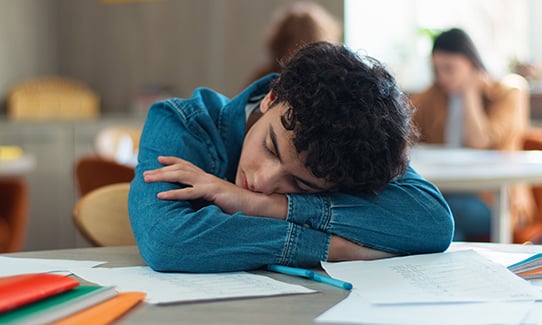

Feb 25 2025
Teen Sleep Squeeze Has Real Health Consequences


Summary
Teens often face sleep deficits due to a mix of biological changes, schedules and poor sleep hygiene. These can lead to health, academic and emotional issues.
Are you noticing changes in your teen’s behavior and wondering where your little angel went?
Teenagers in the United States are the most sleep-deprived age group, and their sleep deficit has grown over the past few years. Highly active teens manage high expectations and tight schedules, while electronic devices can keep others awake past their bedtime. Those who suffer with physical abnormalities or certain medical conditions may struggle to sleep well throughout the night.
Lack of sleep can lead to hyperactivity and ADHD-like behaviors. Distinguishing unusual behaviors from those that are typically expected during puberty can be difficult, especially when the teen’s poor sleep quality and quantity is ultimately to blame.
Signs of teen sleep issues can include:
- Being irritable and less empathetic
- Sleeping less than eight hours
- Certain medical conditions
- Excessive use of electronics
A teenager’s developing brain produces hormones that affect emotions and behavior during puberty. The secretion of melatonin – a hormone the body naturally produces to regulate the sleep/wake cycle – is affected, creating a temporary delay in a teen’s internal clock.
Melatonin secretion typically starts about 9 p.m., but during puberty it can be delayed until around 10:30 p.m. With this shift, a teen’s ideal sleep hours would be 11 p.m. to 9 a.m. But that’s not feasible as school typically starts before 8 a.m. Less than 10% of high schoolers are able to get the proper amount of sleep, leading to struggles with academics, social interactions and their health.
Impacts can include:
- Academic issues due to difficulty with memory consolidation and problem solving
- Emotional issues with increasing mood swings, irritability, anxiety and depression, leading teens to avoid social interactions
- Unhealthy risk-taking with nicotine, alcohol and illicit drugs
- Physical issues with hormonal imbalances, obesity and decreased immunity
- Increased risk of sports-related injuries; sleep quality and quantity affect the body’s ability to repair itself and recover
Sometimes, sleep deficits are related to a physical or medical issues. At any age, physical anomalies, such as an overbite, recessed jaw or enlarged tonsils, can increase the risks for poor sleep due to snoring, breathing irregularities, abnormal movements during sleep, having nightmares, sleep terrors and bed wetting.
Narcolepsy is primarily seen in adolescents and young adults. This disorder disrupts the regulation of sleep and wake cycles causing excessive sleepiness, like sleep attacks. In some cases, it can cause cataplexy, the sudden and temporary loss of muscle tone or paralysis, when experiencing sudden strong emotions like laughter or anger. (Think of fainting goats).
However, primary culprits for teen sleep loss are:
- Waking earlier they would naturally
- Exposure to blue light from electronic devices at night
- Overuse of caffeine, especially late in the day
Overstimulation with blue light and caffeine can keep teens awake until midnight or later and makes it more difficult for them to wake and function properly the following day.
Some of the easiest and most recommended healthy sleep habits for teenagers are to:
- Limit late night screen time – blue light mimics daylight and impacts melatonin production.
- Stop using electronics for a least an hour prior to bedtime. Park devices outside bedrooms to prevent sleep interruptions.
- Limit caffeine – particularly in the afternoon and evening. It stimulates the nervous system, making it harder to fall asleep.
- Create a consistent schedule – even on weekends – with eight to 10 hours of sleep.
- Wind down for bed. A relaxing routine can include a warm bath, reading a book or listening to soothing music.
- Ensure your teen’s bedroom is dark, quiet and cool.
- Assist with managing stress. Suggest exercise, meditation or talking to a trusted adult.
- Encourage a balanced diet with regular mealtimes; avoid heavy meals and sugary snacks that can disrupt sleep.
As adults we need to become better educated and set positive examples to help our youth become better sleepers and healthier individuals. Sleep truly is “the golden chain that ties health and our bodies together.”
If your teenager is struggling with abnormal fatigue or sleepiness or if you have noticed abnormal behaviors during sleep, please talk to your doctor so a sleep consultation can be scheduled if appropriate.


Tracy Hamilton, CCSH, RRT-SDS, RPSGT, RST
Tracy Hamilton, CCSH, RRT-SDS, RPSGT, RST, is a sleep navigator with North Mississippi Medical Center’s Sleep Disorders Center. Tracy is certified in Clinical Sleep Health and is a Registered Respiratory Therapist with additional sleep disorders specialties. After five years of prior respiratory and sleep experience, Tracy joined NMMC in 2001.